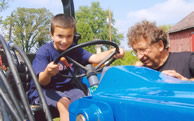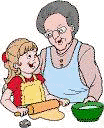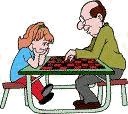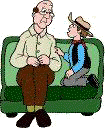The Do's and Don'ts
of Grandparenting
The DOs
DO love your grandchildren as much as you'd like. You can't love them too much. If you don't express your love, it is a sad loss for you and your  grandchildren.
grandchildren.
DO stay in close touch. Telephone your grandchildren directly, or when you're calling their parents, be sure to also talk with the grandchildren. Write letters or e-mail and send pictures and encourage the children to do the same. Save the children's letters for them. They will appreciate them when they are grown. If your grandchildren live nearby, arrange regular visits for doing something special. Introduce them to cultural opportunities that their parents may not have time for, or just spend time with them.
 DO give special gifts for enriched learning. Now may be a time in your life when you are able to purchase a computer or a desk for your grandchildren that would be too expensive for the parents of young children to afford. Your grandchildren will remember that you're the one who gave them that special gift, and their parents will appreciate your help. If the children's parents can't manage the cost of special trip or camp experience, you may be able to help with those opportunities also. If your own finances are limited, sharing some interesting books or toys from your own childhood may provide an in-depth level of enrichment.
DO give special gifts for enriched learning. Now may be a time in your life when you are able to purchase a computer or a desk for your grandchildren that would be too expensive for the parents of young children to afford. Your grandchildren will remember that you're the one who gave them that special gift, and their parents will appreciate your help. If the children's parents can't manage the cost of special trip or camp experience, you may be able to help with those opportunities also. If your own finances are limited, sharing some interesting books or toys from your own childhood may provide an in-depth level of enrichment.
 DO projects with your grandchildren. If you play music, knit, crochet, quilt, sew, or do woodworking or art, share these interests with your grandchildren. Sharing skills can have a great impact on them. It will make the children feel closer to you, and they will learn to appreciate your talents. Furthermore, they will always remember that a particular skill was taught to them by their grandparents.
DO projects with your grandchildren. If you play music, knit, crochet, quilt, sew, or do woodworking or art, share these interests with your grandchildren. Sharing skills can have a great impact on them. It will make the children feel closer to you, and they will learn to appreciate your talents. Furthermore, they will always remember that a particular skill was taught to them by their grandparents.
 DO read to your grandchildren. Encouraging children to love books is always valuable for them. You may wish to share books from your own childhood or from their parents' childhoods. Listen to your grandchildren read to you if they enjoy reading aloud.
DO read to your grandchildren. Encouraging children to love books is always valuable for them. You may wish to share books from your own childhood or from their parents' childhoods. Listen to your grandchildren read to you if they enjoy reading aloud.
DO share stories about your own childhood. Encourage your grandchildren to audio or videotape your stories. They will have them forever and will always be able to see you or hear your voice. They will appreciate the past and have a better sense of history. Encourage their questions and observations.
 DO play games with your grandchildren. Children may be very competitive, so be sure not to let them always win. They should learn to cope with both winning and losing. Children often recall playing board games, cards, or checkers with Grandma or Grandpa. Games are also a nice way for informal communication to just "happen."
DO play games with your grandchildren. Children may be very competitive, so be sure not to let them always win. They should learn to cope with both winning and losing. Children often recall playing board games, cards, or checkers with Grandma or Grandpa. Games are also a nice way for informal communication to just "happen."
 DO listen to your grandchildren. Let them talk to you and tell you stories. Be an attentive audience. Children often love to talk, and other children may not be as interested.
DO listen to your grandchildren. Let them talk to you and tell you stories. Be an attentive audience. Children often love to talk, and other children may not be as interested.
DO say positive things about your grandchildren's parents. If the children believe that you respect their mom and dad, it will help the parents maintain their children's respect. This will be good for your grandchildren and for you. They will respect you too.
DO give your grandchildren a very clear message about education. Tell them how important school and learning are. Ask your grandchildren about their grades and how they're doing, but even more important, ask them about what they're learning in school. Your interest in their learning encourages their interest in their learning.
The Don'ts
 DON'T spoil your grandchildren by giving them too many material possessions. It makes grandparents feel good to give, but it's not good for children to be given too much. They won't appreciate what they have and will only want more. Each time you walk in the door, they'll expect gifts.
DON'T spoil your grandchildren by giving them too many material possessions. It makes grandparents feel good to give, but it's not good for children to be given too much. They won't appreciate what they have and will only want more. Each time you walk in the door, they'll expect gifts.
DON'T sabotage your grandchildren's parent. Don't secretly tell the children, for example, "Well, Dad is punishing you, but now that your Dad is gone, I'll let you watch TV even though he said you couldn't." Sabotaging parents is the most damaging thing that grandparents can do. Children sometimes believe that they're equal to adults, and siding with them against their parents is likely to encourage rebellion and disrespect.
DON'T do too much for your grandchildren. Encourage their independence.
DON'T impose your value system on your children's parenting styles. There may be differences in philosophy between a grandparent and a parent, but the grandparent must defer to the parent's wishes. Grandparents should share some (not too much) information based on their many years of parenting but must leave it up to the parents as to whether or not they wish to follow that advice. Sometimes giving your children a parenting book, newspaper article, or tape works best, but, again, giving your children too many newspaper clippings may only make them angry and cause them to feel like you're trying to control them.
 DON'T tell a grandchild that he or she is your favorite. Don't say they're the smartest, the most creative, the best, or the most special. It may make them feel good, but an there grandchild may learn about that message too. By comparison, the other children will feel less favored. Don't call them "kings" or "princesses." They'll internalize these words as pressures and expectations and may expect too much of themselves or become dependent on praise and attention.
DON'T tell a grandchild that he or she is your favorite. Don't say they're the smartest, the most creative, the best, or the most special. It may make them feel good, but an there grandchild may learn about that message too. By comparison, the other children will feel less favored. Don't call them "kings" or "princesses." They'll internalize these words as pressures and expectations and may expect too much of themselves or become dependent on praise and attention.
DON'T talk to your grandchildren's parents about them in negative ways when the children might overhear it (referential speaking). Children who hear grandparents and parents say, "He's just a mess," "She's so disorganized," "He's so shy," or "She's afraid to try anything," will feel negatively labeled. It's always better to talk positively about children, but to avoid extremes.
©2010 by Sylvia B. Rimm. All rights reserved. This publication, or parts thereof, may not be reproduced in any form without written permission of the author.
